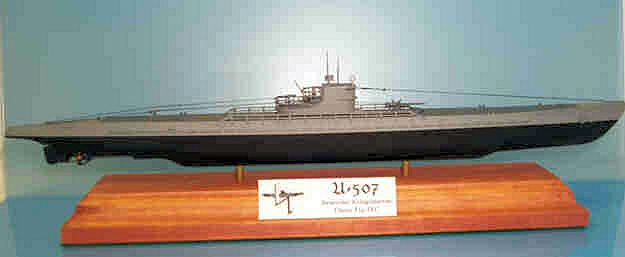Building the Type IXC U-Boat
by Marco Beltram
I have been an aficionado of U-boats for quite some time and so, I purchased this kit on a bit of a whim. At first I was reluctant to buy it because I had heard some mixed information regarding the kit and the fact that it was motorized.
After evaluating the parts I discovered that it was a normal model that had an option to be motorized. (Later I discovered that I had initially mistaken it for another manufacturer’s type IXB that is a motorized only kit) After examining the various sprues and parts I decided to go ahead and give it a try. Am I ever glad that I did.

After I began working with the Nichimo kit, I began to get more enthusiastic. As I removed the parts from the box, I was glad to see that the quality of the detail in the injection molding was quite nice. It required very little cleanup with an Xacto knife. Assembly was relatively straightforward yet, some attention needed to be paid to the alignment of the upper and lower hulls.
Additionally, the assembly of the stern area around the screws and stern planes could get a bit challenging and having some way to support the hull inverted is a must while working on this area.
Fortunately the kit is split at the water line and the lower hull is a solid piece. This makes it very convenient to paint the lower and upper hulls. This also lends the kit to be assembled and displayed as a waterline kit should you so decide, even though the manufacturer did this so you could replace the batteries should you choose to motorize the kit.
Through my travels in Europe I was able to acquire significant sources of information as well as a large number of actual engineering drawings of type VII and type IX. Thanks to the benefit of some of my German books on U-Boats as well as line drawings, I was able to fairly accurately match the color schemes to how the boat would have looked when leaving on patrol in March of 1942.
If you follow the painting instructions provided, you will have a scheme of how the boat would have looked leaving the yard on delivery to the Navy, that is red lead on the lower hull, black chat line at the W.L., grey upper surfaces with a natural wood colored deck with metal grates. I elected to use a scheme that was more indicative of how the boats would more likely have looked preparing to sail on patrol from one of the bases in the Bay of Biscay such as Lorient.
A black hull below the water line, grey surfaces above, with the wooden areas of the deck painted a darker grey and natural metal grates. As I am a complete novice at airbrushing, I elected to spray the model using conventional Testors Model Master Spray paints. I sprayed the entire model using the spray paints except for the metal grates and metal areas which were brush painted.
For the grates, and all metal areas, as well as the shafts I used Humbrol’s polished steel color and found I got almost the exact effect that I was looking for. I also used Humbrol’s Brass for the screws. Some of the finishing details were fairly simple. I used fine black thread on the fore and aft parts of the boat to rig the HF/LW/MW radio antennas that are quite often mistaken for net guards. I also used the thread for the anti-fouling lines on the forward dive planes. These were set in place with a little super glue.

The base was another story. The kit comes with what I feel is a rather poor base considering the potential of the model to be a very nice finished product. Naturally, I felt I could do better. I took a block of wood about 12″ x 6″ x 2″ or so, and ran it through my table router with a Roman Ogee bit to give the base a finished look. I did not want just a block of solid wood. I stained it with a cherry stain and used 7/32″ brass tubing to support the kit. I simply drilled two holes in the keel of the kit and the friction of the plastic against the tubing supports the kit. Finally I printed a label with U-507’s emblem and her name and applied that with photo mount onto a piece of sheet plastic. Then I attached the plaque to the base.
Why U- 507? I chose U-507 as the namesake for this kit after reading her operational history. U-507 along with U-506 operated in the Gulf of Mexico in the spring of 1942 and amassed quite a number of victories among them. U-507 sank several ships less than 30 miles from the mouth of the Mississippi River and 10 victories during her patrol in the gulf in the spring of 1942. Below I have included some of U-507’s particulars.
U-507 Type IXC
Ordered 20 October 1939
Laid Down 11 September 1940 Deutsche Werfte AG, Hamburg
Launched 15 July 1941
Comissioned 8 October 1941
Commanders 8 October 1941 – 13 January 1943
Korvettenkapitan Harro Schacht (Knights Cross)
Career 4 Patrols (224 days)
8 Oct 1941 – 25 Feb 1942 4. Flotilla (Training)
1 Mar 1942 – 13 Jan 1943 2. Flotilla
(Front Boat)
Successes 19 ships sunk – 77,144 GRT
1 ship damaged – 6,561 GRT

Fate
Sunk 13 Jan 1943 in the South Atlantic, North West of Natal, Brazil, in
position S01°38′ W39°52′ by depth charges from a USN Catalina from VP-83.
54 dead, all hands lost.
Ships hit by U-507 while on Patrol in the Gulf of Mexico from 4 Apr 1942 – 4 Jun 1942.
Date Name of Ship Tonnage Nationality Fate
30 Apr 1942 Federal 2,881 tonnes US Sunk
4 May 1942 Norlindo 2,686 tonnes. US Sunk
5 May 1942 Munger T. Ball 5,104 tonnes US Sunk
5 May 1942 Joseph M. Cudahy 6,950 tonnes US Sunk
6 May 1942 Alcoa Puritan 6,759 tonnes US Sunk
7 May 1942 Ontario 3,099 tonnes Honduras Sunk
8 May 1942 Torny 2,424 tonnes Norway Sunk
12 May 1942 Virginia 10,731 tonnes US Sunk
13 May 1942 Gulf Prince 6,561 tonnes US Damaged
16 May 1942 Amapala 4,148 tonnes Honduras Sunk
Technical Specifications
Length O.A. 76.76m
Beam 6.76m
Displacement: 1,081 tonnes
Range – Surfaced – Submerged +/- 13,450nm @ 10 knots +/- 80 miles @ 3 knots
Depth Capability- Shipyard Certified 100m (328 feet)
Test Depth 150m (492 feet)
Crush Depth 250m (820 feet)
Typical Complement – 48 men 4 Officers, 6 Warrant Officers, 9 Petty Officers, 29 seamen.
Armament
Fwd Torpedo Tubes, 2 Stern Torpedo Tubes
12 reloads carried internally, 4 externally.
1 x 10.5 cm U-Bootkanone
1 x 3.7 cm FLAK
1 x 2 cm MG C/30
Photos by Jeff Junker
